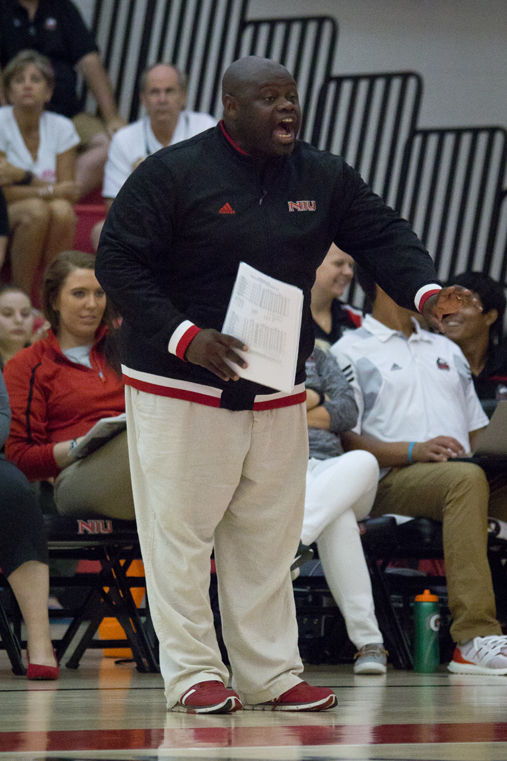Male coaches break gender division
September 22, 2016
DeKALB | Of the nine women’s sports teams at NIU, five of them have a male head coach, six have at least one male assistant coach and four have at least one male volunteer coach.
There are nine male assistant coaches and four volunteer assistant coaches for women’s sports teams. Three of the male head coaches gave their perspective on some of the differences and challenges that come with coaching the opposite sex.
Adrian Myers, women’s cross country head coach and assistant track and field coach, began coaching males at 23 years old but has worked on and off with female athletes since 2011 when he coached the Indiana Invaders National, an Olympic Development Program, and collegiate athletes at Marian University.
Myers’ first time working exclusively with females came when he became a coach at NIU in June 2015.
“To be completely honest, I think you identify with [the same sex] at first and then in my case, you start gravitating towards the other one,” Myers said. “As a young coach, you gravitate towards what you’re most comfortable with.”
Myers said male athletes want immediate credibility from their coach and the coaches have to work a little harder to ensure the athlete buys into what they are saying, whereas a female athlete will accept a coach with less credibility, and comes in and immediately shows they care for each individual.
Myers said the ability to cultivate confidence in female athletes is one of the hardest things to do in his profession.
“Men, a lot of times to a fault, might be overly confident,” Myers said. “The guy who is seventh string quarterback on the football team is going to play in the NFL. That’s [a man’s] thought. Women, on the other end of the spectrum at times, might be one of your top athletes and maybe think they aren’t as good as they really are.”
Myers credits his wife and daughter for teaching him about working with females more than any book or mentor could. Once Myers had a female athlete tutoring his daughter. When he asked the athlete how much he should pay her for helping his daughter, the athlete said to pay her whatever he wanted. Myers then told his wife.
“My wife gets on the phone [with the athlete] and says ‘That’s why women get paid less than men, because you don’t set a value on your work.’ ” Myers said. “ ‘So you tell us how much we need to pay you and we’ll pay you that much money.’ ”
Ray Gooden, women’s volleyball head coach, was 21 when he began coaching females at the collegiate level and said one of the challenges was to ensure he kept his attitude strictly professional because of the age difference.
“I can’t hang with them,” Gooden said. “I can’t do the social thing with them because it’s not professional. And I was taught that, fortunately, at a very young age. The relationships of coach-player can be very deep, and that level of trust is tremendous, so you don’t want to challenge that by making choices that are going to jeopardize that.”
Peer acceptance is a major factor on the women’s side, Gooden said.
“Females don’t want to fail in front of their friends,” Gooden said. “Whereas a guy could care less. [Females] don’t want to be a failure to anything. Not only to themselves, but more importantly to their teammates and to others around that they feel they’re letting down.”
John Ross, women’s soccer head coach, said he has coached both sexes at the younger and collegiate levels, but he said the differences narrow between the sexes as they get older.
Women have more opportunities in college, but there are more opportunities for males professionally, Ross said.
“If you look at it right now, women’s soccer is the most popular female sport, according to numbers that are playing it,” Ross said. “And if you look at the recent World Cup and Olympics, it’s the most watched. I think there has to be more [of an] emphasis on the opportunities that can be there for women’s soccer players.”
Gooden said there is a level of care he does not always understand with female athletes, and the intangibles are most challenging when coaching women.
Myers said setting pride aside and keeping an open mind are two of the most powerful traits a male coach could have when coaching women.
“I think as a male coach, it all boils down to dropping the act like you’re a machismo; you’re a jock; like everything’s tested by physicality,” Myers said. “I think you have to be capable to sit there if someone just broke up with their significant other to weed through that situation and be patient enough and understanding and not just take it as ‘Oh, girl problems’ because, no, it’s guy problems too. But a guy will probably go to their buddies before they go to their coach, and that’s just how it works.







